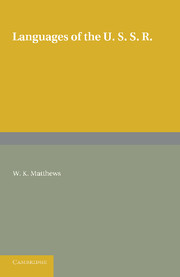Book contents
- Frontmatter
- Contents
- LIST OF ILLUSTRATIONS
- PREFACE
- Map
- Chapter I THE LINGUISTIC PATTERN
- Chapter II PALAEOASIATIG LANGUAGES
- Chapter III URALIAN LANGUAGES
- Chapter IV ALTAIC LANGUAGES
- Chapter V NORTH CAUCASIAN LANGUAGES
- Chapter VI SOUTH CAUCASIAN LANGUAGES
- Chapter VII INDO-EUROPEAN LANGUAGES
- Appendix I TABULAR SUMMARY
- Appendix II LANGUAGE STATISTICS
- Appendix III BIBLIOGRAPHY
- Appendix VI INDEX OF LANGUAGES AND DIALECTS
- Appendix V SYMBOLS AND PHONETIC VALUES
- INDEX
Chapter V - NORTH CAUCASIAN LANGUAGES
Published online by Cambridge University Press: 05 June 2016
- Frontmatter
- Contents
- LIST OF ILLUSTRATIONS
- PREFACE
- Map
- Chapter I THE LINGUISTIC PATTERN
- Chapter II PALAEOASIATIG LANGUAGES
- Chapter III URALIAN LANGUAGES
- Chapter IV ALTAIC LANGUAGES
- Chapter V NORTH CAUCASIAN LANGUAGES
- Chapter VI SOUTH CAUCASIAN LANGUAGES
- Chapter VII INDO-EUROPEAN LANGUAGES
- Appendix I TABULAR SUMMARY
- Appendix II LANGUAGE STATISTICS
- Appendix III BIBLIOGRAPHY
- Appendix VI INDEX OF LANGUAGES AND DIALECTS
- Appendix V SYMBOLS AND PHONETIC VALUES
- INDEX
Summary
Of the various Turkic languages, the North-Western types, Karachay, Balkar, and Kumyk, and the South-Western type, Azerbaijani, are near neighbours of the languages of North and South Caucasian stock, all of which are spoken within the congested area of the Caucasus. Summarising the researches of Baron P. K. Uslar, R. von Erckert, N. J. Marr, A. Dirr, and others, Prince N. Troubetzkoy (Trubeckoj) distinguishes three major types of languages in use there, exclusive of Turkic and Indo-European, viz. North-East, North-West, and South Caucasian. The North-East Caucasian, or Checheno-Lezginian type comprises the Chechen, Ingush, and Tsova-Tush (Bats) of the former Chechen-Ingush Autonomous Republic (now the Grozny province) and the Lezginian complex, consisting of Awaro- Andian (twelve languages spoken in North-West Daghestan), Dargwa, Kubachi, Lak (also called Kazikumukh), and Archi in Central Daghestan, and the Samur group, i.e. Lezgin proper, in its two principal dialects Kyuri and Akhti, Agul, Tabassaran, Budukh (Budug), Jek, Rutul (Mykhad), Tsakhur, Khinalugh, which is spoken in a single village, and Udi, which is the language of two villages, in South-East Daghestan. Some investigators, among them Marr and G. Dumézil, prefer to separate the Chechenian from the Lezginian types by treating the latter as more properly East Caucasian, and the former as Central Caucasian. AH these languages are structurally and lexically related among themselves and more distantly to North-West Caucasian, or Abkhazo-Circassian. To the last group belong the more southerly Abkhaz, with its dialects, in the Abkhaz Autonomous Republic (capital Sukhumi), which is federated with Georgia, and the more northerly Adyge, spoken in two forms—Kabardin, in the Kabarda Autonomous Republic (capital Nal'chik), and Circassian (Cherkess, Kyakh), in the Circassian and the Adyge Autonomous Republics (capitals Cherkessk and Maikop respectively). A third type of North-West Caucasian is usually listed, viz. Ubykh, which is now almost extinct along the north-east coast of the Black Sea and survives chiefly in Asia Minor.
South Caucasian (Iverian),the only well-articulated languagestock in the Caucasus, consists of Georgian and its congeners Mingrelian (Megrel) and Laz (Chan), now sometimes covered by the inclusive name Zan, and the rather more divergent Svanetian (Svan). These languages are spoken as varieties of a single structural type in the Georgian Federal Republic (capital Tbilisi, formerly Tiflis).
- Type
- Chapter
- Information
- Languages of the USSR , pp. 86 - 96Publisher: Cambridge University PressPrint publication year: 2013



